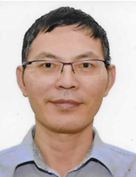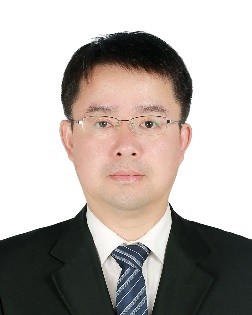University of Calabria, Italy
Bio: Giuseppe Carbone has got his PhD degree in Robotics from the University of Cassino, Italy, in 2004 He has been visiting professor at Universidad Carlos III of Madrid, Beihang University, Waseda University, and several other well-reputed International Research Institutions. From 2024 he has joined East China Jiaotong University. From 2020 he is Chair of IFToMM TC on Robotics and Mechatronics. From 2018 he has joined University of Calabria, Italy. From 2018 to 2021 he has been Visiting professor at Sheffield Hallam University, UK where he served as Senior Lecturer and member of the Executive board of Sheffield Robotics from 2015 to 2017. He has been Scientific Director of the International Research Laboratory Intelligent Robotic Systems and Technologies. Among others he is Editor-in-Chief of Robotica Journal (Cambridge Univ. Press), Section EIC of Journal of Bionic Engineering, MDPI Robotics, MDPI Machines, Technical Editor of IEEE/ASME Transactions on Mechatronics. He has been PI or co-PI of more than 20 projects including 7th European Framework and H2020 funds. He has received more than 20 Best Paper awards and more than 10 International Best Patent awards. His research interests cover aspects of Engineering Design, Mechanics of Robots, Mechanics of Manipulation and Grasp, Mechanics of Machinery with over 500 research paper outputs, 20 patents, and 16 Phd completions (8 ongoing). He has been also member of 20 PhD evaluation Commissions in Italy, Spain, Finland, UK, Romania, Mexico, India. He has been invited to deliver Keynote speeches and lectures on his research activity at more than 30 International events. He edited/co-edited four books that have been published by Springer and Elsevier International Publishers. h-index 40 n. citations >6000 (source google scholar). In January 2023 he received an Honoris Causa Doctoral Degree from Technical University of Cluj-Napoca (Romania). In June 2023 he received an Honoris Causa Doctoral Degree from University of Craiova (Romania).
Abstract:This presentation highlights design strategies that embed intelligence into robotic grippers and hands, showing how effective functionality can arise from the synergy of mechanics, sensing, and control rather than from expensive complexity. By focusing on simplicity in mechanical structures and modular architectures, we demonstrate how grasping systems can combine robustness with adaptability while remaining cost-effective to manufacture and maintain. Streamlined actuation methods—employing fewer motors and optimized linkages—will be presented as practical solutions for ensuring reliable performance across a wide range of tasks. Drawing on case studies and simulation results, we further illustrate how iterative prototyping and virtual testing can uncover opportunities for refinement early in development, leading to grasping solutions that are not only efficient in design but also intelligent in operation.

Prof. Yinquan Yu
East China Jiaotong University, China
Bio: Yinquan Yu was born in Anqing, China. He received his Ph.D. degree in electrical and computer engineering from the National University of Singapore, Singapore, in 2008 and 2014, respectively. From 2008 to 2018, he was a Scientist at the Agency for Science, Technology and Research (A*STAR), Singapore. From 2019 to 2023, he was with the School of Mechatronics and Vehicle Engineering, East China Jiaotong University, Nanchang, China, and assumed duties of the Director of the Institute of Intelligent Manufacturing and Precision Research, the Director of the Intelligent Transportation Tools and Power Control Research Center, and the Deputy Director of the Key Laboratory of transport tools and equipment of the Ministry of Education. Since 2024, he has been an Adjunct Professor with Xiamen University, Malaysia Campus, Sepang, Malaysia, and East China Jiaotong University. He is the author of two books, one book chapter, one conference proceeding, and more than 60 journal articles. He holds over 25 inventions. His research interests include smart manufacturing, smart permanent magnet synchronous motors (SPMSMs), machine health monitoring and fault diagnosis, mechatronics and robotics, shock absorption and noise reduction for high-speed and high-precision equipment, intelligent manufacturing, and precision machining.,Dr. Yu has received several honors, including the Best Symposium Paper Award at ISPECE in 2020, the Outstanding Contribution Award from the International Conference on Science and Technology Academic Exchange in 2021, and the IEEE PES (China) Outstanding Contribution Award in 2022. He served as the responsible person for Singapore Manufacturing Intelligent and Technologies (SMIT). He serves as a Guest Editor for the Special Issue on Wireless Sensors and Artificial Intelligence in Smart Manufacturing for the internationally renowned International Journal of Distributed Sensor Networks and holds ten patents.Title: Report on Fault Monitoring and Fault-Tolerant Operation of Permanent Magnet Synchronous Motors under Extreme Conditions
Abstract: This report addresses the challenges of Permanent Magnet Synchronous Motors (PMSMs) in rail traction systems under extreme conditions, such as heavy load, frequent start–stop, and torque fluctuations, which can cause irreversible demagnetization and performance degradation. A flux linkage monitoring method combining the Honey Badger Algorithm (HBA) with an integral sliding mode observer enables rapid online parameter tuning and accurate fault detection. Control performance is enhanced using Non-singular Fast Terminal Sliding Mode Control (NFTSMC) with the Improved Grey Wolf Optimizer (IGWO) for online parameter optimization. Additionally, an Equivalent Input Disturbance (EID)-based approach with Deadbeat Predictive Current Control (DBPCC) compensates for parameter mismatch. Experimental results confirm that these methods effectively detect faults and maintain stable PMSM operation, providing practical solutions for reliable rail traction systems.

Assoc. Prof. Kai Wu
South China University of Technology, China
Bio: Kai Wu received his Ph.D. in mechanical engineering from Ruhr University Bochum, Germany. He is currently an associate professor at the South China University of Technology, where he leads the Joint Lab of Intelligent Sanitation Robots and Equipment and the Lab of Remote Ultrasound Medical Robots. Additionally, he serves as the Associate Editor of Robotica and an editor of Biomimetic Intelligence and Robotics.His research interests include intelligent robotics, robot-assisted manufacturing, and intelligent vehicles, with a focus on motion control, path planning, multi-sensor information fusion, and human-robot interaction.
Title:Presentation title: Smart robotic assembly for complex tasks in manufacturing
Abstract:With the acceleration of product iteration and the increasing demand for customization, intelligent production and manufacturing systems that can rapidly respond to product changes are crucial. As a key flexible production unit in intelligent manufacturing systems, robots face challenges in the rapid development and deployment of new processes and tasks, which pose demands for advancements in robotic technology. This presentation will explore, based on existing robot simulation systems, the application of AI and digital twin technologies to address complex assembly tasks in the manufacturing process.

Nanjing University of Science and Technology
Prof. Wang is the editor of SCIE journal IJAMCS, and served as the General Chair of ICRCV2024-2021, Publication Chair of ICCAD2024, Co-Chair of Program Committee of the 27th IEEE Int. Conf. on Robot and Human Interactive Communication (ROMAN’2018), and participation to more than 30 conference organization. He was selected as World's Top 2% Scientists, based on Stanford and Elsevier Data, in 2024, and enlisted also in ‘Jiangsu Provincial 333 High-Level Talent Training Program’, ‘Jiangsu Provincial Project Blue: Young Academic Leader’, ‘Six Talent Peaks of High Level Talents’, etc. Prof. Wang is currently Dean of Zhizhi Academy of NJUST, Executive deputy Director of the Sino-French International Joint Laboratory of Automatic Control and Signal Processing, Deputy Director of the Jiangsu Enterprise Development Engineering Association, and Deputy Director of the Rehabilitation Medicine Engineering and Transformation Committee of the Jiangsu Rehabilitation Medicine Association, member of Chinese Association of Automation (CAA), Committee member of Data Driven Control Learning and Optimization Professional Committee (DDCLS-CAA), and the Committee member of the energy Internet Committee –CAA, etc.
Title: Ultra-local Model based Data & Intelligent Technique Driven Model Free Adaptive Control and Applications to Complex Mechatronic Robotic Systems
Abstract:With the advancement of new technology and industrial transformation, complex mechatronic robotic systems (CMRS) which integrate advanced sensors, control algorithms, artificial intelligence, and other technologies are being widely applied in industrial production, smart manufacturing, power-assisted systems, and surgical medicine robots. Compared to traditional mechatronic systems, CMRS possess intelligent sensing, execution, and control capabilities, enabling them to better adapt to complex and dynamic working environments and task requirements. This significantly enhances industrial mass production efficiency and standards, driving the high-quality development of the real-world intelligent manufacturing industry. However, due to their complex structure and multiple degrees of freedom, CMRS are susceptible to input nonlinearities such as backlash, input saturation, dead zones, actuator failures, complex friction, and quantization, making it highly challenging to achieve high-precision trajectory tracking control. Therefore considering the referred CMRS affected by different input nonlinearities and frictions, under an ultra-local model based data-driven model-free control framework, this lecture focuses on the introduction and development of a new data and intelligent technique driven model-free adaptive trajectory tracking prescribed performance control.

